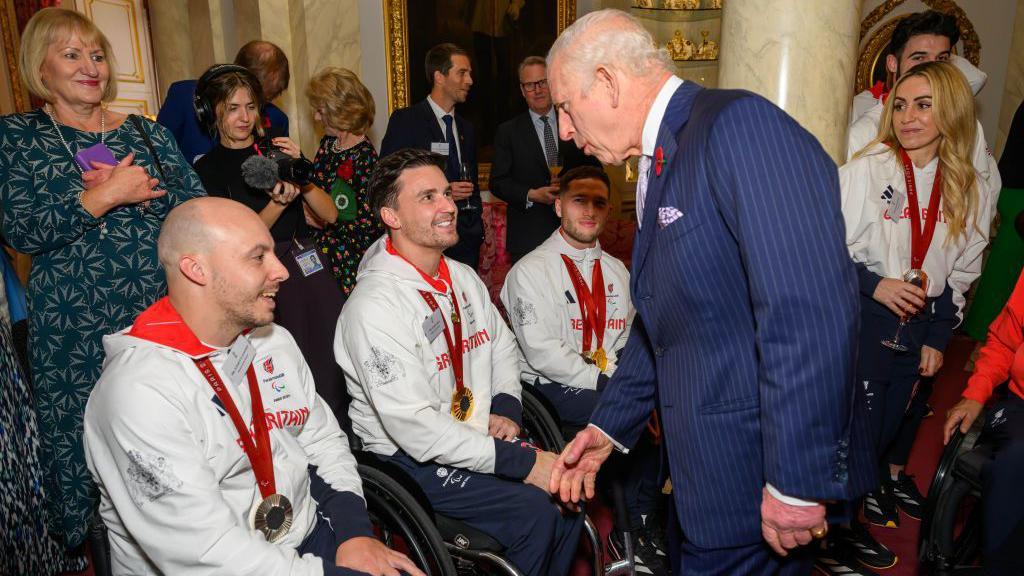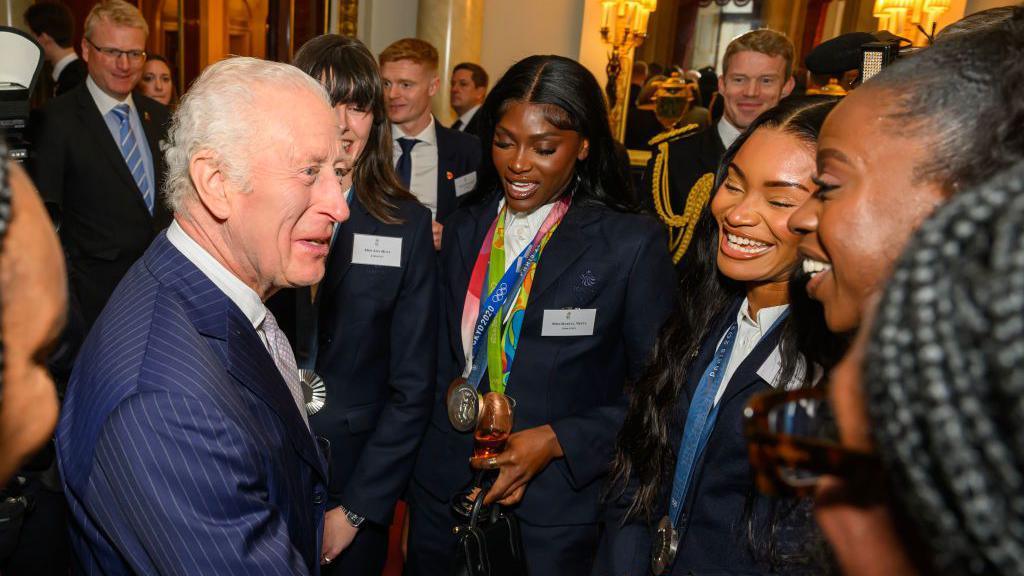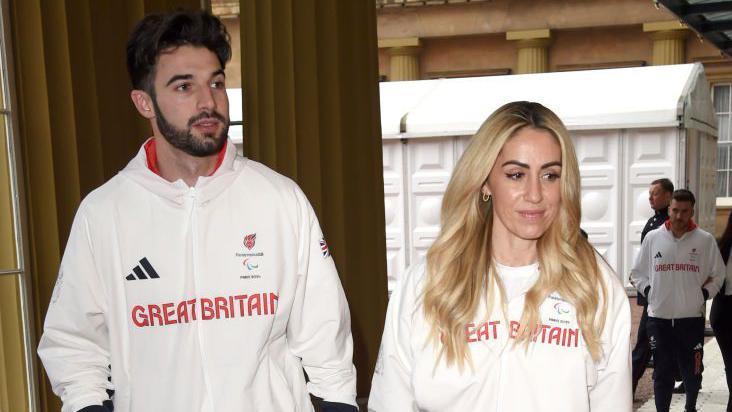Why do Team GB and ParalympicsGB run separately?

Although they wear very similar kits, Team GB and ParalympicsGB are separate teams and organisations
- Published
A positive year for ParalympicsGB, in which the team won 124 medals at Paris 2024, has ended on something of a sour note.
Athletes criticised luxury department store Fortnum & Mason for holding a party for Olympians, following a Buckingham Palace reception for Olympic and Paralympic athletes - but not inviting any Paralympians.
Paralympic sprinter Zac Shaw called this "hurtful" in a viral social media post, while Para-cyclist Archie Atkinson told BBC Sport it was “disrespectful”.
Fortnum & Mason has apologised for the "mistake" and said a separate Paralympics event is being organised.
In his post,, external Shaw said it was a symptom of a "wider issue" of how disabled athletes are treated differently in sport.
"Why is it Team GB and ParalympicsGB? Why don't we compete under the same name," he asked.
This was a question asked by several other Paralympians. Gold-medal winning sprinter Jonnie Peacock wrote on X: "Is it finally about time Team GB and ParalympicsGB think about merging? Can only imagine improving equality would be easier?"
That might also be a common question for those not familiar with the nuances of sports governance. The two teams wore very similar kit at Paris 2024 for example, save for the differing Olympic and Paralympic logos.
They do have some connections - notably a shared office space in Fitzrovia, central London - and they have also shared facilities at Games previously.
Most nations have separate organisations for their Olympic and Paralympic teams, although some like Team USA are combined. In Paris, the hosts competed as Team France in both Games.
So, why are they separate and could they ever merge?
Why are they separate?

Team GB athletes wore specially made suits for the event at Buckingham Palace - these were not provided for Paralympians
There are two primary reasons for the separation - historical and financial.
The Paralympics are significantly younger than the Olympics. The first Paralympic Games took place in 1960, 66 years after the maiden modern summer Olympics.
The British Paralympic Association was founded in 1989 and has overseen Games participation ever since.
The two associations have different funding structures. Team GB is 100% operated from commercial funding, and its function is to send Great British teams to IOC competitions during an Olympic cycle, including events such as the Youth Olympic Games.
ParalympicsGB, meanwhile, is a charity - it gets some UK Sport funding, while the rest is corporate partnerships. It sends a team to fewer events than Team GB.
The two organisations' budgets are considerably different. Team GB, in the most recent Olympic cycle to 2024, had a £70m income across the four-year period - used for taking a team of 327 athletes to Paris.
Over the same period, ParalympicsGB operated on £30m and took a team of 215 athletes to France.
Since 2021, top sponsors of the Olympics have had an automatic opt-in to Paralympic global rights, but this has not been universally taken.
Team GB has a total of 33 commercial partners listed on its website, while ParalympicsGB has 19. Nine companies sponsor both - Adidas, Aldi, Allianz, British Gas, Deloitte, Dreams, Ocean, TikTok and Eurostar.
Whether brands would want to fund both teams, or provide enough money to effectively do so, is another barrier to a merger.
Nicky Kemp, editorial director of marketing consultancy Creativebrief, told BBC Sport: "Combining the organisations is a worthwhile debate to be having, but it could dilute both.
"You have to allow brands that flexibility to sponsor either the Olympics, Paralympics or both.
"You want the best of both worlds, and not to lose that uniqueness. Sport is so diverse and complex that if you combine these organisations you could end up making it less inclusive."
Will they ever merge?

ParalympicsGB athlete Zac Shaw (left) was one of several athletes to publicly voice their unhappiness about the Fortnum & Mason after-party
The Fortnum & Mason episode has not been the only incident that has raised questions over why Paralympic athletes have been treated differently compared to their Olympic counterparts.
Having a smaller budget means ParalympicsGB has to make savings that would not be considered by Team GB - such as suits for athletes.
Team GB were provided suits for the Olympic opening ceremony and at Buckingham Palace, while Paralympic athletes wore tracksuits at both events.
"Why were we at Buckingham Palace in tracksuits, when the Olympians were provided suits?" Shaw asked on social media.
A ParalympicsGB spokesperson told BBC Sport that suits were provided to athletes for Tokyo 2020, but many did not wear them and after conducting an athlete poll, it was decided not to produce them for Paris 2024 in the name of sustainability.
There was also a Team GB ball in recent days, which some Para-athletes said they wished they could be included in.
"It [the ball] is something that Team GB have always done but another thing that we don't have, for some reason," para-equestrian athlete Natasha Baker said. "I do think it would be nice if there was more collaboration between Team GB and ParalympicsGB.
"The whole Palace/Fortnum & Mason thing was a bit of a disaster sadly and with better communication shouldn't have happened."
Negative PR could put off brands, says Kemp, but she says those which do fund Para-sport can be richly rewarded.
"A big issue in marketing currently is the fear of cancel culture, a universal fear of getting it wrong which could stop investment," she said.
Some brands, such as British Gas, have been praised for prominently featuring Paralympians in their adverts, while others have adapted after negative reactions.
Channel 4 was criticised for its 'superhumans' branding of its Paralympic coverage, with some feeling it created the impression of Paralympians being abnormal. The branding was dropped for Paris 2024, for which Channel 4 was the UK broadcaster and provided comprehensive television coverage of the Games.
"Ultimately, if you do not represent society, you are not reflecting your customers," said Kemp.
There have been some improvements in ParalympicsGB forging an image of its own. Adidas sold dedicated Paralympic team merchandise for the first time for Paris 2024.
For now, a merger of Team GB and ParalympicsGB seems highly unlikely.
David Clarke, ParalympicsGB chief executive, told BBC Sport: "There's no doubt that globally the Olympic movement is still far better resourced than the Paralympic movement and following a fantastically successful Paris Paralympics we would certainly hope to see this differential continue to reduce.
"Like the vast majority of nations, ParalympicsGB and Team GB are separate organisations. We are independent but work collaboratively with each other.
"Our performance speaks for itself - winning 124 medals, including 49 gold, across a record 18 different sports to finish second in the medal table at the Paris 2024 Paralympic Games, while campaigning for equal access to sporting opportunities for all disabled people in the UK.”